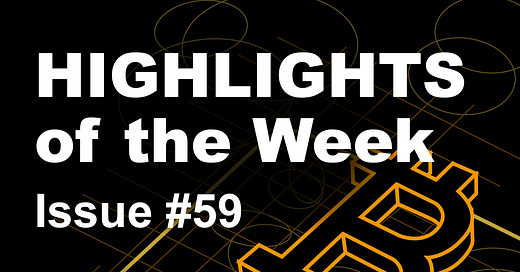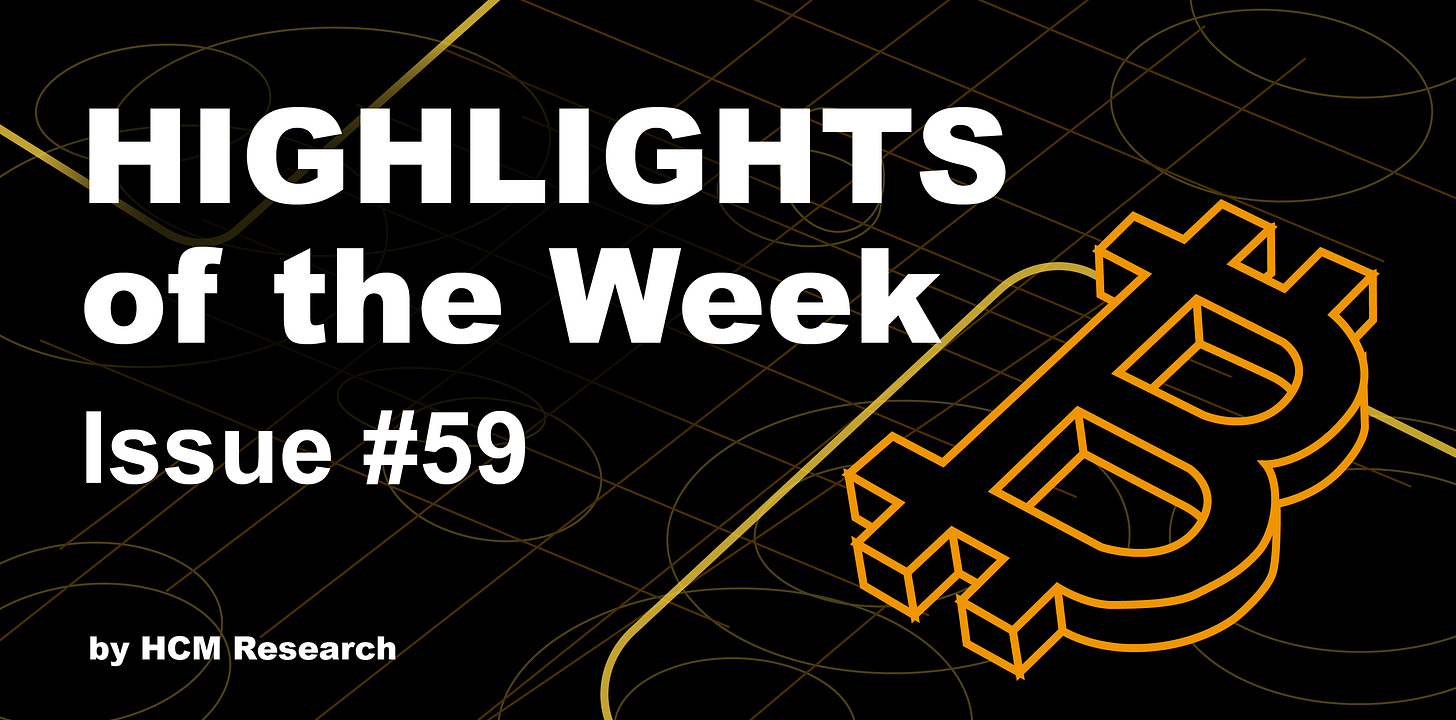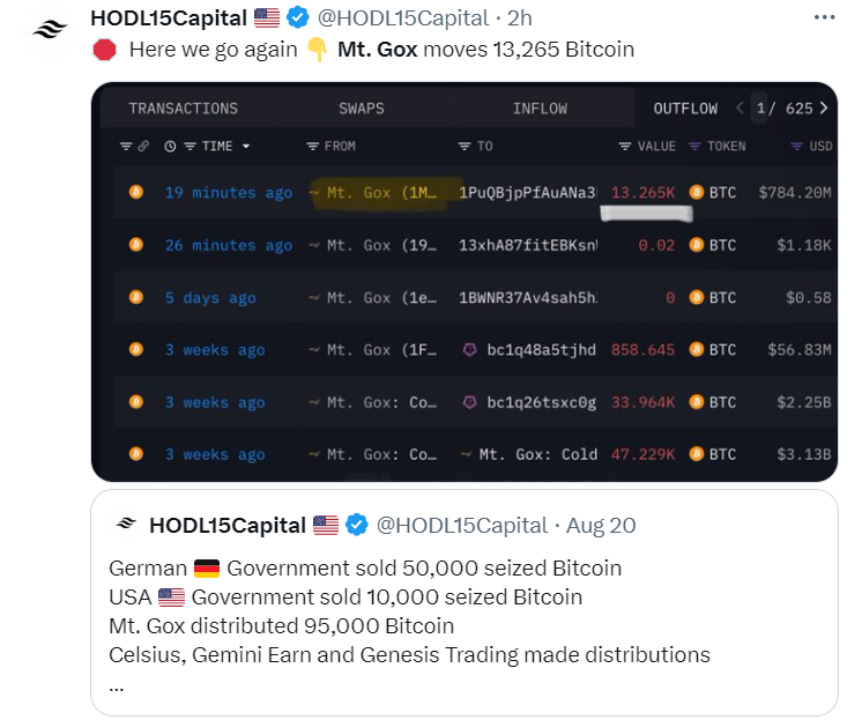Highlights of the Week- Issue #59
Preview
Last week, Robert F. Kennedy Jr. has withdrawn from the 2024 U.S. presidential race, sparking speculation of a possible alliance with Donald Trump, particularly given Kennedy's pro-Bitcoin stance. In El Salvador, a new training program for 80,000 government employees aims to bolster Bitcoin adoption in public policy. Meanwhile, Japanese firm Metaplanet expanded its Bitcoin holdings to 3.45 billion Yen. Ark, a Bitcoin scaling proposal, secured $2.5 million in funding to advance its technology. Defunct exchange Mt. Gox moved 12,000 Bitcoin, fueling creditor distribution rumors. Sygnum bank syndicated a $50 million Bitcoin-backed loan to Ledn, marking a significant move in Bitcoin-collateralized lending. Hong Kong's spot Bitcoin ETFs saw their largest inflow in over a month, indicating growing institutional interest. Telegram CEO Pavel Durov was reportedly arrested in France on various charges, stirring controversy. For more details, continue reading below.
A. Bitcoin Data Dashboard
1. Bitcoin Transactions
2. Supply
3. Mining
4. Transaction Fees
5. Difficulty Retarget
6. Lightning Network (Public)
B. Bitcoin Ecosystem
1. RFK Jr. withdraws from 2024 presidential race amid speculation of Trump alliance
2. El Salvador launches Bitcoin Training Program for 80,000 government employees
3. Metaplanet acquires 500 million Yen in Bitcoin, boosts total holdings to 3.45 billion Yen
4. Bitcoin scaling proposal Ark secures $2.5 million funding round, advances with new wallet and beta testing
5. Mt. Gox moves 12,000 Bitcoin to unknown wallet in major transaction, fuels speculation on creditor distributions
6. Sygnum syndicates $50 million loan to Ledn, advancing Bitcoin-collateralized lending standards
7. Hong Kong Spot Bitcoin ETFs see largest inflow in over a month, signaling growing interest
8. Telegram CEO Pavel Durov arrested in France on multiple charges
C. Regulation
D. Macroeconomy
1. Fed chair Jerome Powell signals potential rate cuts in September amid easing inflation
2. Domestic liquidity stagnates amid Fed-Treasury standoff; global conditions improve slightly
A. Bitcoin Data Dashboard
As of Aug 26,2024
B. Bitcoin Ecosystem
1. RFK Jr. withdraws from 2024 presidential race amid speculation of Trump alliance
Robert F. Kennedy Jr., the independent candidate for the 2024 U.S. presidential race, has officially withdrawn, according to a document filed on August 22 with the Arizona Secretary of State. This decision, announced just before his scheduled speech in Arizona on August 23, marks a significant development in the race. Kennedy’s exit follows comments from Republican frontrunner Donald Trump, who hinted at the possibility of Kennedy joining his administration if he dropped out of the race. This has fueled speculation about a potential collaboration, particularly given Kennedy's strong stance on Bitcoin-friendly policies, including his proposal to back the U.S. dollar with Bitcoin. A potential alliance between Trump and Kennedy could reshape the election landscape and have far-reaching implications, especially for U.S. bitcoin regulation. Kennedy’s pro-bitcoin stance has garnered significant attention, and his withdrawal might influence how these issues are addressed in the upcoming election, affecting not only U.S. policy but also global regulatory standards.
Reference: Cointelegraph
2. El Salvador launches Bitcoin Training Program for 80,000 government employees
El Salvador's National Bitcoin Office (ONBTC) has initiated a comprehensive training program to educate 80,000 government employees on Bitcoin's strategic management and its integration into public policy. This effort is part of the country's broader push to solidify its position as a global leader in Bitcoin adoption. The 160-hour virtual course, titled “Certification in Public Administration 1,” is divided into seven modules, each focusing on different aspects of Bitcoin's use as legal tender, including relevant laws, skills, and management practices. Stacy Herbert, the director of ONBTC, believes that training civil servants will have a "compounding effect" on the nation’s Bitcoin-driven economy. She views these educational efforts as critical long-term investments in the success of El Salvador’s Bitcoin and tech policies. Herbert also hinted at the launch of additional educational initiatives aimed at further embedding Bitcoin into the country's economic framework. The certification program is conducted by the Higher School of Innovation in Public Administration (ESIAP), an institution established by President Nayib Bukele in August 2021. The curriculum is tailored to enhance the standard of excellence in governance and public administration, aligning with El Salvador’s pioneering role in Bitcoin adoption.
Reference: Cointelegraph
3. Metaplanet acquires 500 million Yen in Bitcoin, boosts total holdings to 3.45 billion Yen
Metaplanet, a publicly traded Japanese company, has recently purchased an additional 500 million Yen ($3.7 million) worth of Bitcoin. This latest acquisition includes 57.273 bitcoins, bought at an average price of 8.73 million Yen per bitcoin. With this purchase, Metaplanet’s total Bitcoin holdings now stand at 360.368 bitcoins, valued at approximately 3.45 billion Yen ($25.6 million). This acquisition follows Metaplanet's recent financial moves, including a 1 Yen billion loan secured just a week ago to support its Bitcoin investment strategy. The company initially announced on August 6 its plan to raise 10.08 billion Yen through public offerings to fund its Bitcoin purchases. So far, the funds from the loan have been used to buy over 100 bitcoins, reinforcing Metaplanet’s commitment to expanding its Bitcoin reserves. Metaplanet’s strategy mirrors that of MicroStrategy, the U.S.-based firm known for its substantial Bitcoin holdings achieved through raising capital via debt and equity. MicroStrategy has amassed over 226,500 bitcoins since 2020, positioning itself as a major player in corporate Bitcoin investment. This trend extends beyond Metaplanet and MicroStrategy. Other public companies, such as Marathon Digital Holdings, have also raised significant capital for Bitcoin acquisitions.
Reference: Bitcoin magazine
4. Bitcoin scaling proposal Ark secures $2.5 million funding round, advances with new wallet and beta testing
Bitcoin scaling proposal Ark is advancing quickly with a $2.5 million pre-seed funding round led by Tim Draper and Draper Associates. This funding supports Ark Labs’ goal to simplify Bitcoin transactions, making them faster and more user-friendly. Ark, initially conceived as an alternative to the Lightning Network, now aims to enhance existing Layer 2 solutions. Co-founder Marco Argentieri emphasized that Ark will build on Lightning’s progress and improve the self-custodial experience. Ark uses trustless servers to address Lightning infrastructure challenges, avoiding custodial trade-offs found in other solutions. Draper praised Ark for its potential to offer decentralized Bitcoin payments. Despite initial hurdles in refining the protocol’s documentation, the alpha version of Ark’s covenant-less implementation is now available on GitHub. The Ark Node wallet and a closed beta testing phase are set for early September. Alongside Draper Associates, Fulgur Ventures and angel investor Stephen Cole participated in the funding. Ark Labs invites developers and partners to join their efforts in advancing Bitcoin’s utility.
Reference: Bitcoin magazine
5. Mt. Gox moves 12,000 Bitcoin to unknown wallet in major transaction, fuels speculation on creditor distributions
Defunct crypto exchange Mt. Gox has recently transferred 12,000 Bitcoin, worth $709.4 million, to a new, unknown wallet on August 20. This move marks the first significant transaction from Mt. Gox since late July. Additionally, 1,265 BTC, valued at $74.8 million, was sent to an address labeled as a Mt. Gox cold wallet but has remained static. This transaction could signal Mt. Gox's preparation to distribute Bitcoin to its creditors, who have been awaiting their funds since the exchange's collapse in 2014. However, Galaxy's Alex Thorn suggests that only a portion of the moved funds are intended for distribution, with the remainder likely going into new cold storage. The recent transfer follows a July 30 move where Mt. Gox sent 47,229 BTC to three unknown addresses. It is suspected that part of these funds was sent to BitGo, a custodian working with the Mt. Gox trustee. Since then, these funds have remained in an unknown address. As of now, Mt. Gox still holds 46,164 BTC, worth approximately $2.7 billion. Many creditors appear to be holding onto their Bitcoin, potentially due to beliefs in Bitcoin’s technology and expectations of future price increases. This approach also helps avoid immediate capital gains taxes.
Reference: Cointelegraph
6. Sygnum syndicates $50 million loan to Ledn, advancing Bitcoin-collateralized lending standards
Ledn has secured a $50 million Bitcoin-backed syndicated loan from Sygnum, a Swiss digital asset bank with ~$4.5 billion in client assets. This loan, provided by Sygnum's institutional clients, will support Ledn's expansion in retail lending, allowing clients to use Bitcoin holdings as collateral, which will be held in qualified custody for security and regulatory compliance. Benedikt Koedel of Sygnum highlighted that this is the first Bitcoin-backed syndicated loan from a regulated bank, marking a significant step in institutional lending within the bitcoin sector. The loan aims to build confidence in Bitcoin-collateralized lending and unlock liquidity in the $1.38 trillion syndicated loan market. Adam Reeds, CEO of Ledn, expressed pride in collaborating with Sygnum to set new standards in transparency and risk management for digital asset lending, aligning with Ledn’s commitment to security and regulatory compliance.
Reference: Bitcoin magazine
7. Hong Kong Spot Bitcoin ETFs see largest inflow in over a month, signaling growing interest
Hong Kong's spot Bitcoin ETFs experienced their largest inflow in over a month, reflecting rising Asian interest in Bitcoin investments. On August 22, the ChinaAMC Bitcoin ETF received 274 Bitcoin, valued at approximately $15 million, marking its biggest single-day inflow since July 12. Approved earlier this year, Hong Kong's first three spot Bitcoin ETFs allow investors to gain Bitcoin exposure without holding the asset directly. While volumes are still smaller compared to the U.S., inflows are increasing. The ChinaAMC Bitcoin ETF leads with over $141 million in net assets, while Bosera Hashkey and Harvest manage about $99 million and $30 million, respectively. In total, the three Hong Kong spot Bitcoin ETFs manage approximately 4,450 BTC, worth around $270 million. This growth suggests a rising interest and adoption of Bitcoin among Asian institutional investors, as the asset matures and attracts regulated investment products like spot ETFs.
Reference: Bitcoin magazine, Cointelegraph
8. Telegram CEO Pavel Durov arrested in France on multiple charges
Telegram CEO Pavel Durov has reportedly been arrested in France on multiple charges, including terrorism, trafficking, conspiracy, fraud, and money laundering, according to unconfirmed social media and press reports. He was allegedly detained upon arriving at Bourget airport near Paris from Azerbaijan. French network TF1 noted that Durov's arrest was linked to a search warrant activated only if he was on French soil, and that he typically avoids European countries where Telegram is under surveillance. High-profile figures have weighed in on the situation. American commentator Candace Owens criticized the arrest as a move against free speech, while Tucker Carlson described it as a warning to platform owners resisting government censorship.
Reference: Cointelegraph
C. Regulation
1. US Treasury and Federal Reserve to redefine 'Money' to include digital asset in new reporting rules
The US Treasury and Federal Reserve are set to redefine “money” under the Bank Secrecy Act to include digital assets in new reporting requirements. This change aims to bring cryptocurrencies and traditional fiat currencies under the same regulatory framework. The Treasury's August semiannual regulatory agenda reveals that the Federal Reserve and Financial Crimes Enforcement Network (FinCEN) plan to update the definition of “money” to cover both domestic and international transactions involving convertible virtual currencies, including central bank digital currencies. The proposed rule changes, expected to be finalized by September 2025, will require reporting for transactions involving cryptocurrencies with legal tender status. Additionally, the US Department of Justice (DOJ) is updating its guidelines to impose stricter penalties for crimes involving artificial intelligence, seeking to expand regulations beyond current standards.
Reference: Cointelegraph
D. Macroeconomy
1. Fed chair Jerome Powell signals potential rate cuts in September amid easing inflation
Federal Reserve Chair Jerome Powell signaled that the central bank is likely to begin cutting interest rates in September, marking a significant shift from its recent policy of aggressive rate hikes. Speaking at the Fed’s annual symposium in Jackson Hole, Wyoming, Powell noted that while inflation is easing, the labor market is showing signs of weakening, creating conditions for rate cuts. He emphasized that the timing and size of these cuts will depend on future economic data, but many analysts expect a quarter-point reduction. This marks a notable change from the Fed’s earlier stance, where it insisted on not lowering rates until inflation was clearly on a sustained path back to its 2% target. Recent data showed that inflation dropped to 2.5% in June, down from a peak of 5.6% in 2022, and job growth has slowed, with only 114,000 jobs added in July. Powell also reflected on the Fed's efforts to achieve a "soft landing"—reducing inflation without causing a recession. He attributed the success to the Fed's rate hikes, which helped keep inflation expectations stable. As pandemic-related disruptions have waned and labor shortages eased, inflationary pressures have diminished, allowing the Fed to consider a more accommodative policy. Looking ahead, many forecasters believe the Fed could lower rates by up to a full percentage point by year’s end, depending on economic conditions.
Reference: USA Today
2. Domestic liquidity stagnates amid Fed-Treasury standoff; global conditions improve slightly
US domestic liquidity continues to hover around the same levels, as the Treasury and Federal Reserve engage in offsetting policy actions that keep the overall liquidity environment stable. Looking ahead, This sideways trend in domestic liquidity to persist until the reverse repo facility usage declines to zero, down from its current level or until another significant liquidity event occurs. Policymakers seem determined to maintain these steady liquidity conditions, carefully navigating to avoid any sudden disruptions. The liquidity "floor" is gradually rising, driven by the slow but steady expansion of the banking system’s assets and liabilities over time. On a global scale, liquidity conditions have shown a modest improvement, largely influenced by a weaker U.S. dollar index. This weakening has provided some relief, allowing global liquidity to inch upwards. However, the pace of this change has been slow, leading to a situation where, despite some positive movement, global liquidity conditions remain largely within a defined range. While there are early signs of a potential breakout, the overall environment still reflects a cautious and measured approach, with global liquidity not yet showing significant shifts that would indicate a major change in direction.
Reference: Lyn Alden













